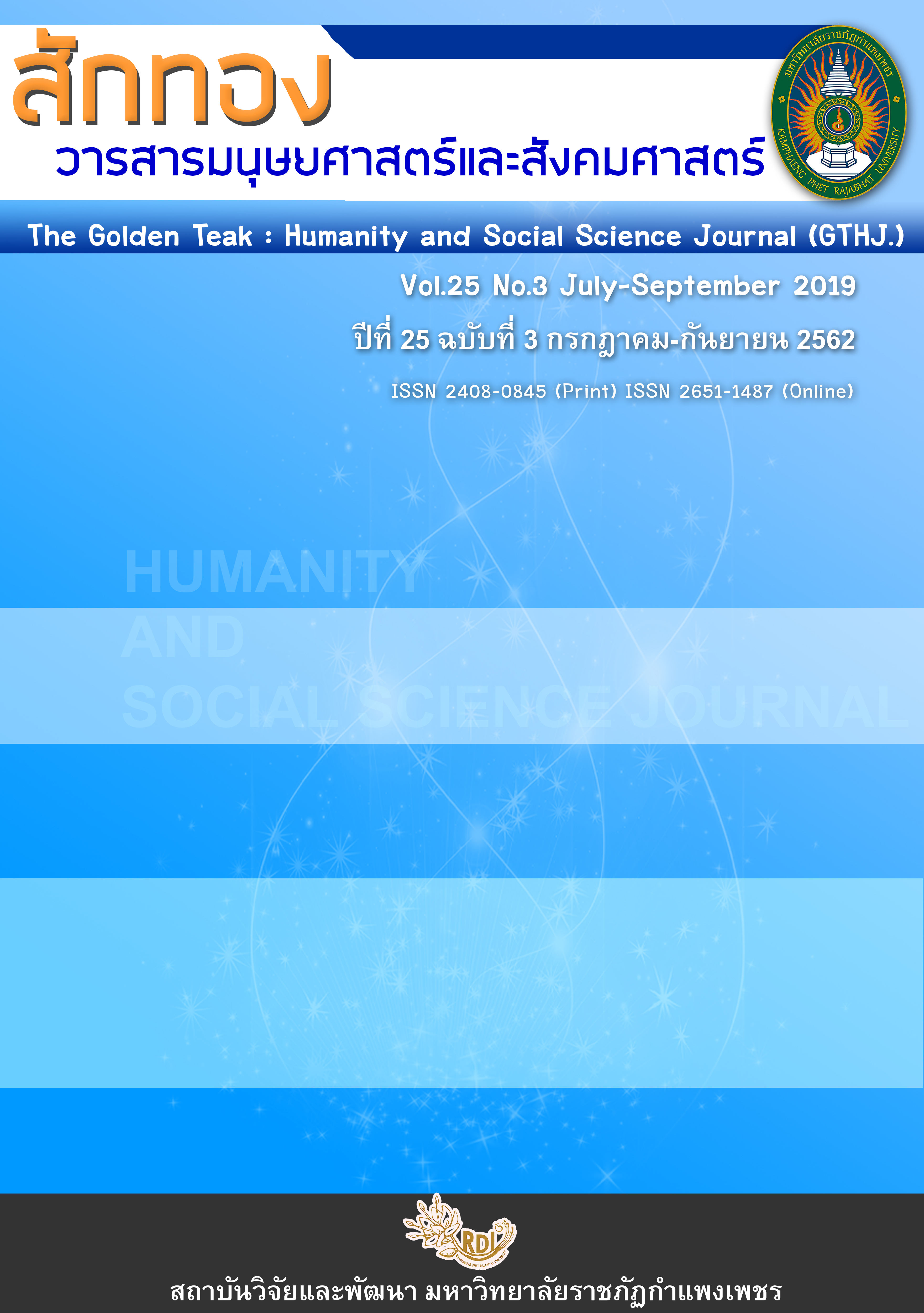A Causal Model of Transformational Leadership, Psychological Meaningfulness, Work Role Fit, Mediated by Meaning of Work, Affecting Work Engagement of Private School Teachers
Main Article Content
Abstract
The purposes of this study were to: 1) study transformational leadership, psychological meaningfulness, work role fit, meaning of work, and work engagement of private school teachers; and 2) develop and testify the concordance of a causal model of transformational leadership, psychological meaningfulness, work role fit, mediated by meaning of work, affecting work engagement of these teachers. A sample of 300 was selected from the private school teachers, by means of multi-stage random sampling method. The data were collected using a questionnaire constructed by the researcher. Questionnaire copies of 280, or 93.33 per cent were returned and usable. The statistics used in data analysis were descriptive statistics, correlation coefficient analysis, confirmatory factor analysis, and structural equation model analysis. The findings revealed as follows. 1) Transformational leadership, psychological meaningfulness, work role fit, meaning of work, and work engagement of private school teachers were all rated at the high level. 2) The developed causal model was consistent with the empirical data by considering on Chi-square = 58.15, P = 0.51, df= 59, Chi=square/df= 0.99, GFI = 0.97, AGFI = 0.95, standardize RMR = 0.009 and RMSEA = 0.000
Article Details
บทความที่ได้รับการตีพิมพ์เป็นลิขสิทธิ์ของวารสาร สักทอง : วารสารมนุษยศาสตร์และสังคมศาสตร์ สถาบันวิจัยและพัฒนา มหาวิทยาลับราชภัฏกำแพงเพชร
ข้อคิดเห็นใดๆ ที่ปรากฎในวารสารเป็นวรรณกรรมของผู้เขียนโดยเฉพาะ ซึ่งมหาวิทยาลัยราชภัฏกำแพงเพชรและบรรณาธิการไม่จำเป็นต้องเห็นด้วย
References
of Job Retention of Teachers in Schools Under the Surin Educational Service
Area Office 1, Surin Province. Presented in Partial Fulfillment of the Requirements
for the Master of Education degree in Education Research and Statistics at
Srinakharinwirot University.
Avolio, B.J. & Bass, B.M. (2004). Multifactor leadership questionnaire : Third edition manual
and sampler set. Redwood City, CA : Mind Garden.
Bakker, A. B. & Demerouti, E. (2008). Towards a model of work engagement. Career
Development International, 13(2), 209-223.
Britt, T.W. (1999). Engaging the self in the field: Testing the triangle model of responsibility.
Personality and Social Psychology Bulletin, 25, 696-706.
Chang, M.L. (2009). An appraisal perspective of teacher burnout: Examining the emotional
work of teachers. Educational Psychology Review, 21(3), 193-218
Coetzee, M. & Villiers, M.De. (2010). Sources of Job Stress, Work Engagement and Career
Orientations of Employees in a South African Financial Institution. Southern African
Business Review, 14(1), 27-58.
Hair, J.F., et al. (2010). Multivariate data analysis : A global perspective. Upper Saddle River,
NJ : Pearson.
Hamukang’ andu, L. (2013). Meaning of Work And Work Engagement Among Educators In
Choma District, Zambia. Ph. D. (Organization Psychology). Denver : Graduate School
The University of Namibia. Photocopied.
Jacobs, H. (2013). An Examination of Psychological Meaningfulness, Saffty, and Avaliability
as The Underlying Mechanisms Linking Job Features and Personal Characteristics to Work Engagement. Ph. D. (Psychology). Florida International University of Miami at Florida. Photocopied.
Kahn, W.A. (1990). Psychological conditions of personal disengagement at work. Academy of
Management Journal, 33, 692-724.
Kawto, S. (2001). Education News. (Online). Available : http://www.bangkokbiznews.com
[2018, September 10].
May, D.R. (2003). Fostering the human spirit at work : Toward an understanding of the
influences on employees’ experienced meaningfulness at work. Unpublished
script.
May, D.R., Gilson, R.L. & Harter, L.M. (2004). The Psychological Conditions of Meaningfulness,
Safety and Availability and the Engagement of the Human Spirit at Work. Journal of
Occupational and Organizational Psychology, 77(1), 11-37.
Phumirat, C. (2011). Education News. (Online). Available : http://www.thaischool.in.th
[2018, September 10].
Robertson-Smith, Gemma. & Markwick, Carl. (2009). Employee Engagement A Review of
Current Thinking. Brighton: Institute for Employment Studies Mantell Building University of Sussex Campus.
Rosso, B.D., Dekas, K.H. & Wrzesniewski, A. (2010). On the meaning of work: A theoretical
integration and review. Research in Organisational Behavior, 30, 91-127.
Saks, A.M. (2006). Antecedents & consequences of employee engagement. Journal of
Managerial Psychology, 21(7), 600-619.
Schaufeli, W.B., et al. (2002). The measurement of engagement and burnout : A two sample
confirmatory factor analytic approach. Journal of Happiness studies, 3(1), 71-92.
Schaufeli, W.B. & Bakker, A.B. (2004). Job demands, job resources, and their relationship with
burnout and engagement : A multi-sample study. Journal of Organizational Behaviour, 25, 293–315.
Schaufeli, W.B. & Salanova. M. (2008). Enhancing work engagement through the management
of human resources, in Naswall, K., Hellgran, J. and Snerks, M. (Eds.). The Individual in
the changing working life (pp. 380-402). Cambridge: Cambridge University Press.
Schaufeli, W.B. & Bakker, A.B. (2010). Defining and Measuring Work Engagement: Bring Clarity
to the Concept. In Work Engagement: A Handbook of Essential Theory and
Research. Bakker, Arnold B.; & Leiter, Michael. Pp. 10-24. New York: Psychology Press.
Smith, Heather kaye. (2012). Testing Work Characteristics as Mediating Factors in the
Relationships among Nurse Leadership, Burnout, and Engagement. Thesis, M.S.
(Psychology). Knoxville : Graduate School The University of Tennessee at Knoxville.
Photocopied.
Woodcock, Chelsea. (2012). Transformational Leadership and Employee Engagement.
Dissertation, Ph. D. (Psychology). DeKalb: Graduate School The University of Northern Illinois at DeKalb. Photocopied.
Wrzesniewski, A. (2012). Callings. In K.S. Cameron and G. M. Spreitzer (Eds.), The Oxford
handbook of positive organizational scholarship. (pp. 45-55) New York, NY : Oxford University Press.
Wrzesniewski, A., Tosti, J. & Landman, J. (2011). If I could turn back time: Occupational
regret and its consequences for work and life. Working paper.


